Why Investing for the Future Matters
Before we get into the nitty-gritty, let’s talk about why this decision is so important. Did you know that over 60% of people regret not starting to invest earlier in life? Whether it’s saving for retirement, buying a dream home, or ensuring your family’s security, investing is the bridge between where you are now and where you want to be. But here’s the catch—not every investment is a one-size-fits-all solution. Term insurance offers peace of mind, SIPs promise gradual wealth, and shares tempt with big rewards. So, how do you choose? Let’s break it down step by step.
Table of Contents
Section 1: What is Term Insurance and Should You Consider It?
Understanding Term Insurance
Term insurance is like a financial safety net. It’s a type of life insurance that covers you for a specific period—say, 10, 20, or 30 years. If you pass away during that term, your beneficiaries (like your spouse or kids) receive a lump-sum payout called the death benefit. If you outlive the term? Well, the coverage ends, and you don’t get anything back. Simple, right?
The Perks of Term Insurance
- Affordable Protection: Term insurance is one of the cheapest ways to ensure your family’s financial security. For a small premium, you can get a large cover—sometimes 10-20 times your annual income!
- Peace of Mind: Knowing your loved ones won’t be burdened with debts or expenses if something happens to you? Priceless.
- No Fuss: It’s straightforward—no complicated investment components or hidden fees.
The Downsides
- No Returns: If you survive the term, you don’t get your premiums back. It’s not about growing money—it’s about protection.
- Temporary: Once the term ends, you’re back to square one unless you renew (which gets pricier as you age).
Who Should Go for Term Insurance?
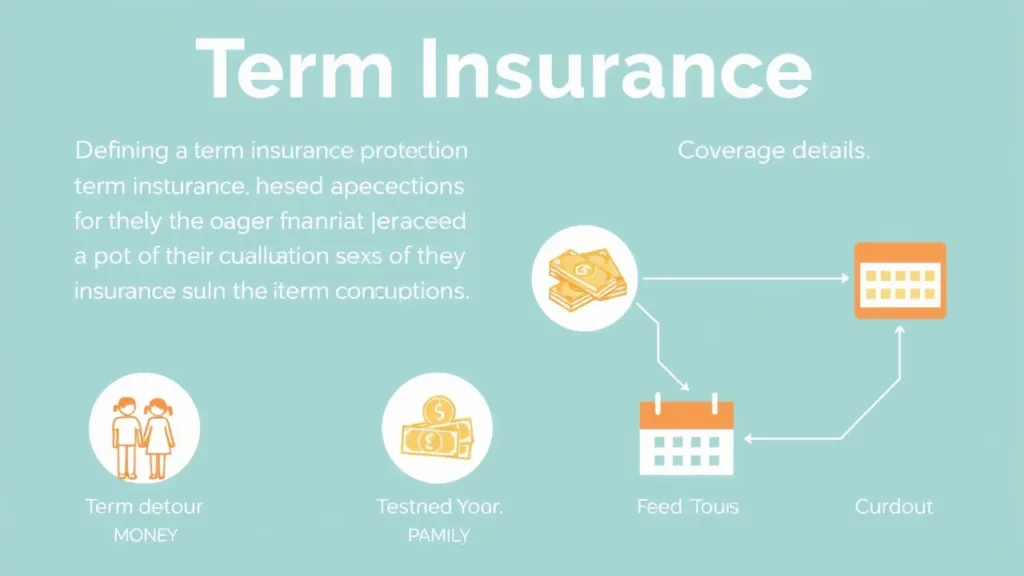
- People with dependents (think kids, spouse, or aging parents)
- Anyone with loans or financial responsibilities
- Those who want a low-cost way to secure their family’s future
“Term insurance isn’t about making money—it’s about making sure your family doesn’t lose everything.” — Priya Sharma, Financial Advisor
Section 2: Systematic Investment Plans (SIPs) – The Slow and Steady Winner?
What’s a SIP All About?
A Systematic Investment Plan (SIP) is like planting a seed that grows into a mighty tree over time. It’s a way to invest in mutual funds by putting in a fixed amount regularly—say, ₹1000 every month. Your money gets pooled into a fund that invests in stocks, bonds, or a mix of both, depending on the scheme you choose.
Why SIPs Are Awesome
- Rupee Cost Averaging: When markets dip, you buy more units; when they rise, you buy fewer. Over time, this smooths out the ups and downs.
- Compounding Magic: The earlier you start, the more your money grows. A ₹5000 monthly SIP at 12% returns could balloon to over ₹50 lakhs in 20 years!
- Start Small: You don’t need a fortune—SIPs let you begin with as little as ₹500.
- Diversification: Your money is spread across multiple assets, lowering risk compared to betting on one stock.
The Catch
- Market Risk: Returns aren’t guaranteed. If the market tanks, your SIP value could dip (though it often recovers over time).
- Patience Required: SIPs shine in the long run, so you need to stick with it—even when markets get shaky.
Who Should Choose SIPs?
- Long-term planners (retirement, kids’ education, etc.)
- Beginners who want a hands-off investment
- People who like steady growth over wild gambles
“SIPs are like a fitness routine—consistency beats intensity every time.” — Anil Kapoor, Mutual Fund Expert
Section 3: Shares – High Risk, High Reward?
What Are Shares?
When you buy shares (or stocks), you’re buying a tiny piece of a company. If the company does well, your shares rise in value, and you might even get dividends. If it flops? Well, you could lose money. It’s the Wild West of investing!
Why Shares Are Exciting
- Big Returns: Over decades, stock markets have delivered 10-12% average annual returns—beating most other options.
- Flexibility: Buy and sell whenever you want (as long as the market’s open).
- Ownership Vibes: You’re a part-owner of brands you love—think Reliance, TCS, or even Tesla!
The Risks
- Volatility: Share prices can swing wildly. One day you’re up 10%, the next you’re down 15%.
- Time and Knowledge: Picking winners takes research. Without it, you’re just guessing.
- Stress Factor: Watching your portfolio rollercoaster isn’t for the faint-hearted.
Who Should Invest in Shares?
- Risk-takers who can stomach ups and downs
- People with time to research companies or hire a pro
- Long-term investors who can wait out market slumps
“Shares are a game of patience and guts—play it right, and the rewards are massive.” — Rohan Mehta, Stock Analyst
Section 4: Term Insurance vs. SIP vs. Shares – A Side-by-Side Comparison
Still confused? Let’s put these three head-to-head in a handy table:
| Feature | Term Insurance | SIP | Shares |
|---|---|---|---|
| Risk Level | Low | Medium to High | High |
| Returns | None (protection only) | Market-linked | Market-linked |
| Liquidity | Low (no cash-out) | High (redeem anytime) | High (sell anytime) |
| Time Horizon | Fixed term (10-30 yrs) | Medium to Long (5+ yrs) | Flexible |
| Knowledge Needed | Minimal | Moderate | High |
| Best For | Family security | Wealth building | Wealth maximization |
Quick Takeaways:
- Term Insurance: Your go-to for protection, not profit.
- SIPs: Perfect for steady, low-effort growth.
- Shares: The high-stakes option for big wins (or losses).
Section 5: How to Choose the Right Investment for Your Future
So, which one’s the best? Spoiler alert: It depends on YOU. Here’s what to think about:
1. How Much Risk Can You Handle?
- Scared of losing money? Stick to term insurance or low-risk SIPs (like debt funds).
- Love a challenge? Shares or equity SIPs might be your vibe.
2. What’s Your Goal?
- Protecting your family? Term insurance.
- Growing wealth over time? SIPs or shares.
3. How Long Can You Wait?
- Short-term needs (5-10 years)? Term insurance or SIPs.
- Long-term dreams (15+ years)? Shares or equity SIPs shine here.
4. What’s Your Financial Situation?
- Got loans or kids? Term insurance is a must.
- Extra cash to spare? SIPs or shares can put it to work.
5. What’s the Market Doing?
- Term insurance doesn’t care about markets.
- SIPs and shares thrive in bull markets but can stumble in bear ones.

Section 6: Real-Life Stories – What Worked for Them
Let’s make this real with three fictional (but relatable) examples:
Story 1: Meena, 32, New Mom
- Goal: Secure her baby’s future and save for school fees.
- Choice: ₹50 lakh term insurance + ₹2000 monthly SIP.
- Why: The term plan covers her family if she’s gone, while the SIP grows into a nice education fund by the time her kid’s in college.
Story 2: Vikram, 27, Techie
- Goal: Retire by 50 with a fat nest egg.
- Choice: ₹10,000 monthly SIP in equity funds.
- Why: He’s young, has no dependents, and can ride out market dips for big long-term gains.
Story 3: Sanjay, 40, Entrepreneur
- Goal: Double his money in 10 years.
- Choice: Invests ₹5 lakh in blue-chip shares.
- Why: He’s got market know-how and a cushion of savings, so he’s comfy taking the stock market plunge.
Section 7: FAQs – Your Burning Questions Answered
1. Can I Do All Three—Term Insurance, SIPs, and Shares?
- Absolutely! Many smart investors mix them: term insurance for safety, SIPs for growth, and shares for a shot at the big leagues.
2. How Much Should I Put in an SIP?
- Start with what you can afford—₹500, ₹1000, or more. Aim for 10-20% of your income if possible.
3. Do I Need Term Insurance If I Have Savings?
- If you’ve got dependents, yes. Savings can run out; term insurance guarantees a payout.
4. Are Shares Too Risky for Beginners?
- They can be, but starting small and diversifying (or using a broker) lowers the risk.
5. What’s the Best Age to Start Investing?
- Yesterday! Seriously, the earlier, the better—compounding loves time.
Conclusion: Your Future, Your Choice
So, which investment is the best for your future? It’s not about chasing the highest returns—it’s about what fits your life. Term insurance locks in security for your loved ones. SIPs offer a low-stress path to wealth. Shares tempt with big rewards if you’ve got the stomach for it.
Why not blend them? A solid term plan, a consistent SIP, and a sprinkle of shares could be your recipe for financial success. Not sure where to start? Chat with a financial advisor to tailor a plan just for you.





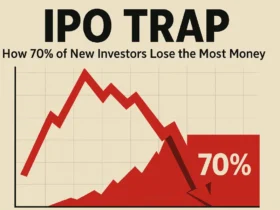







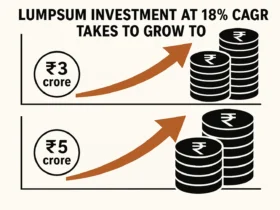
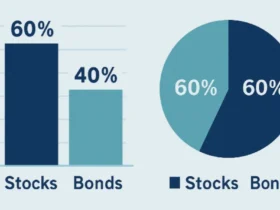





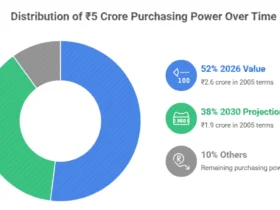





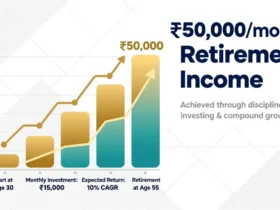

Leave a Reply